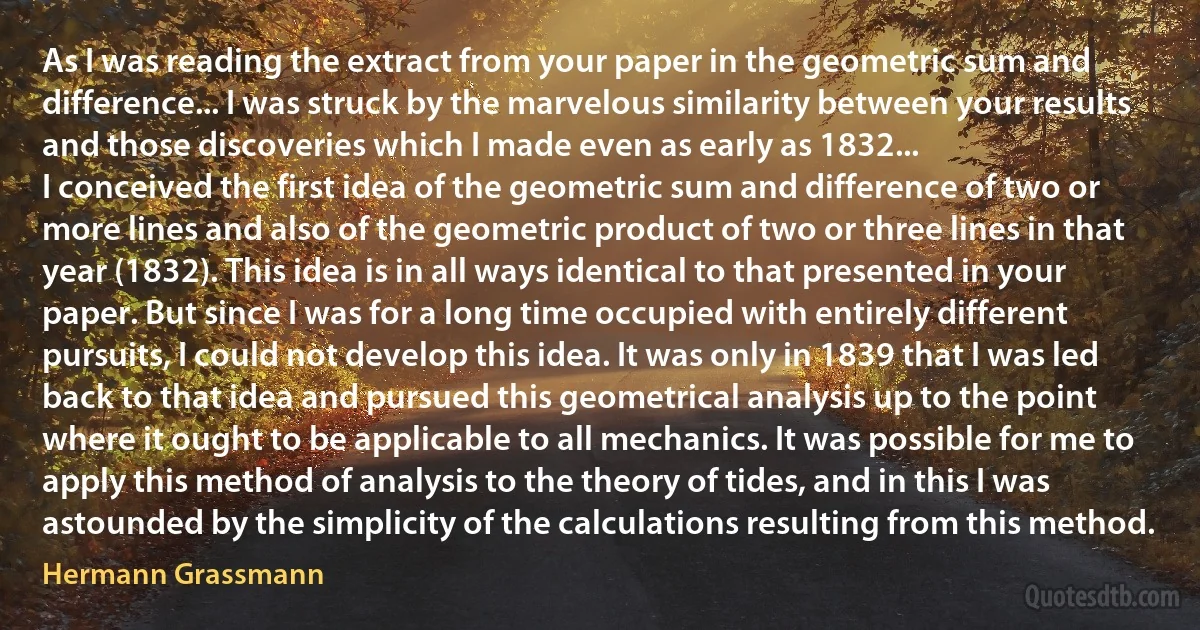
As I was reading the extract from your paper in the geometric sum and difference... I was struck by the marvelous similarity between your results and those discoveries which I made even as early as 1832... I conceived the first idea of the geometric sum and difference of two or more lines and also of the geometric product of two or three lines in that year (1832). This idea is in all ways identical to that presented in your paper. But since I was for a long time occupied with entirely different pursuits, I could not develop this idea. It was only in 1839 that I was led back to that idea and pursued this geometrical analysis up to the point where it ought to be applicable to all mechanics. It was possible for me to apply this method of analysis to the theory of tides, and in this I was astounded by the simplicity of the calculations resulting from this method.
Hermann GrassmannRelated topics
difference different early extract idea led marvelous mechanics ought paper point possible reading similarity strike three time year waysRelated quotes
Personally, I never met Knut Wicksell. I saw him once when he delivered a lecture in Oslo, but being an unassuming student at the time, I did not have the courage to talk to him. So my knowledge of his theory came only through his writings. That, however, was a very intense and absorbing form of making his acquaintance. Already from my early student days, I read his writings (in German and Swedish) avidly. And I continued to do so later.
When I started my study on Wicksell, I found that his works were not easy reading. Often it was only at the third or fourth reading that I grasped his ideas. Invariably, each new reading made me more and more enthusiastic. Sometimes it happened that I thought I had finally caught him in an inconsistency or in unclear thinking. Every time this happened, it turned out, however, that the error was mine.

Ragnar Frisch
It is not true, out of geometry, that the mathematical sciences are, in all their parts those models of finished accuracy which many suppose. The extreme boundaries of analysis have always been as imperfectly understood as the tract beyond the boundaries was absolutely unknown. But the way to enlarge the settled country has not been by keeping within it, but by making voyages of discovery, and I am perfectly convinced that the student should be exercised in this manner; that is, that he should be taught how to examine the boundary, as well as how to cultivate the interior. ...allowing all students whose capacity will let them read on the higher branches of applied mathematics, to have each his chance of being led to the cultivation of those parts of analysis on which rather depends its future progress than its present use in the sciences of matter.

Augustus De Morgan
A true scholarship would examine, and then either accept or reject, with good reason, any new theory which challenges a generally accepted theory admitted to be full of sharp anomalies. However, this has not been the attitude of world scholarship towards our earlier book. The general attitude has been as follows: there is a school of crank scholarship in India which is out to prove, by hook or by crook, that India was the original homeland of the Indo-European family of languages; and the writers of this school deserve to be firmly put in their place. And the best method of doing this is by tarring all scholars who support, or even appear to support, an Indian homeland theory, with one brush; and then pointing out particularly untenable propositions made by one or the other of the scholars so branded together, to prove that all the scholars so named belong to one single school of irrational scholarship.

Shrikant Talageri
In this country - the most favored beneath the bending skies - we have vast areas of the richest and most fertile soil, material resources in inexhaustible abundance, the most marvelous productive machinery on earth, and millions of eager workers ready to apply their labor to that machinery to produce in abundance for every man, woman, and child - and if there are still vast numbers of our people who are the victims of poverty and whose lives are an unceasing struggle all the way from youth to old age, until at last death comes to their rescue and lulls these hapless victims to dreamless sleep, it is not the fault of the Almighty: it cannot be charged to nature, but it is due entirely to the outgrown social system in which we live that ought to be abolished not only in the interest of the toiling masses but in the higher interest of all humanity...

Eugene V. Debs
The revolution of 1832 was, therefore, in its ultimate results, a democratic revolution, though its earlier form was transitional and incomplete. This form was productive of great advantages for the time: indeed, for some years it might be said, without exaggeration, that the accidental equilibrium of political forces which it had produced presented the highest ideal of internal government the world had hitherto seen. But it was not the less provisional on that account. The forces by which political organisms are destroyed were, for the time, balanced by influences which still lingered, and were, therefore, neutralised. But these were increasing, and the others were decaying, and the balance could not last for any length of time. It has now been finally upset, and we have now fully reached the phase of political transformation to which the revolution of 1832 logically led.

Robert Gascoyne-Cecil, 3rd Marquess of Salisbury
